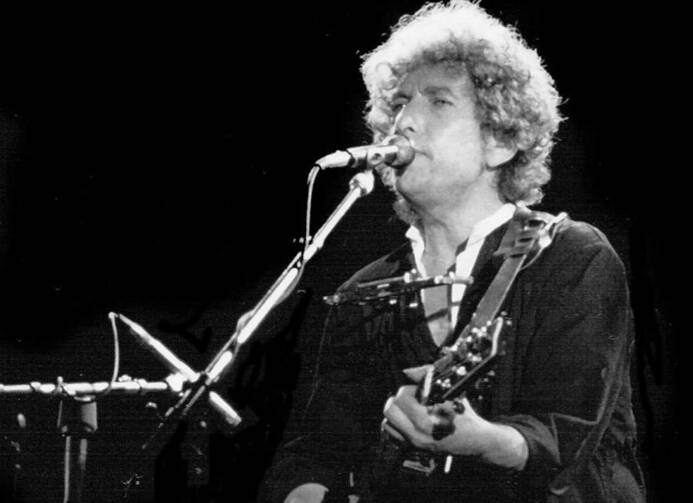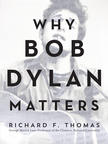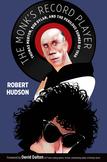What four new books on Bob Dylan can teach us
Five years ago in Central Park, I saw Joan Baez perform in concert with the Indigo Girls. Her famous three-octave range had narrowed over the years, but the legendary folk singer still gave a brilliant performance. As always, her most popular selections were not her own compositions but covers of Bob Dylan songs. One exception was her classic ballad “Diamonds and Rust,” widely believed to be about her relationship with (you guessed it) Bob Dylan, unnamed but called “the unwashed phenomenon, the original vagabond” and who comes off as something of a cad in the song’s verses, including the following:
As I remember your eyes
Were bluer than robin’s eggs
My poetry was lousy you said
Where are you calling from?
A booth in the midwest
Ten years ago
I bought you some cufflinks
You brought me something
We both know what memories can bring
They bring diamonds and rust
But on that night in Central Park in 2013, Baez gave a wicked smile and ad-libbed a line: “Fifty years ago, I bought you some cufflinks.” And, of course, she was right—it had been more than half a century since she introduced the world to Bob Dylan, the soon-to-be musical legend.
Baez announced upon the release of her latest album that she is giving up touring after this summer. Dylan, however, shows little sign of slowing down, having shape-shifted through a dozen versions of himself over more than five decades. Now 76, he has released 38 studio albums since he first burst onto the national music scene on Baez’s arm in 1961. Two years ago, we were reminded of the monumental nature of his artistic output when Dylan was awarded the Nobel Prize for Literature. We were then reminded of the monumental nature of his caddishness when he declined to accept the award or give the requisite lecture. The unwashed phenomenon wasn’t about to clean up his act for anybody.
Dylan came around eventually, accepting his prize and recording an acceptance speech, published late last year as The Nobel Lecture and one of four new books by or about Dylan reviewed here. In a slim 23 pages of text (the lecture is 27 minutes spoken), Dylan is eloquent and gracious, discussing “three books that have stuck with me ever since I read them way back in grammar school,” Moby-Dick, All Quiet on the Western Front and Homer’s “Odyssey.” (He closes with a telling line from the last: “Sing in me, O Muse, and through me tell the story.”) At the same time, he remains a bit of a trickster. Here is Dylan, at his most spare, discussing the climax of Moby-Dick:
Moby attacks Ahab’s boat and destroys it. Next day, he sights Moby again. Boats are lowered again. Moby attacks Ahab’s boat again. On the third day, another boat goes in. More religious allegory. He has risen.
What is this? The prose completely betrays the drama and tension of the scene, one of the most famous in American literature—the battle between Ahab and the White Whale. Here are Herman Melville’s words:
All that most maddens and torments; all that stirs up the lees of things; all truth with malice in it; all that cracks the sinews and cakes the brain; all the subtle demonisms of life and thought; all evil, to crazy Ahab, were visibly personified, and made practically assailable in Moby Dick. He piled upon the whale’s white hump the sum of all the general rage and hate felt by his whole race from Adam down; and then, as if his chest had been a mortar, he burst his hot heart’s shell upon it.
Why does Dylan give such a deadpan, staccato gloss to such eloquence? Is Dylan praising Melville or burying him? Does he even like Moby-Dick? “Ishmael survives,” Dylan lets us know. “He’s in the sea floating on a coffin. And that’s about it. That’s the whole story. That theme and all that it implies would work its way into more than a few of my songs.”
The effect of reading the text of Bob Dylan’s songs is to remind one of the value of them as text. He commands the English language at a level often underappreciated by even his own fans.
For those who appreciate a deep dive into Dylan’s poetics, a new compendium, 100 Songs, offers a spare, no-commentary presentation of his lyrics, presented precisely as poetry. Selections are drawn from the entirety of his career, from 1962’s flattery-by-imitation paean to Woody Guthrie, “Song to Woody,” all the way through the somewhat incongruous 2006 paean to Alicia Keys, “Thunder on the Mountain.” In between there are verses from Dylan the folk singer, Dylan the country singer, Dylan the rocker, Dylan the evangelical Christian and all the other avatars through which he has presented himself.
It is a book I would have loved to have on hand in 2012 when I taught a college course on the “Poetics of Bob Dylan” (only some of the students regularly arrived stoned) because the effect of reading the text of Dylan’s songs is to remind one of the value of them as text. He commands the English language at a level often underappreciated by even his own fans. A classic example is “You’re Gonna Make Me Lonesome When You Go,” a heartbreaking lyrical masterpiece from “Blood on the Tracks,” Dylan’s 1975 tour de force on love and theft. Listeners might prefer the covers by Madeleine Peyroux or Elvis Costello, because Dylan’s voice, as often, fails his own poetry.
The opening stanza:
I've seen love go by my door
It’s never been this close before
Never been so easy or so slow
I’ve been shooting in the dark too long
When something’s not right it’s wrong
You’re gonna make me lonesome when you go.
Four stanzas later, he sings:
Situations have ended sad
Relationships have all been bad
Mine’s been like Verlaine and Rimbaud
But there’s no way I can compare
All those scenes to this affair
You’re gonna make me lonesome when you go.
Verlaine and Rimbaud? Really? This seems on the surface nothing more than a cheap visual pun on the differences between French and English: Look ma, I can rhyme Rimbaud with go. The literary reference is so obscure that in his cover of the song, Elvis Costello sings “Mine have been like the lanes and rambles,” which is probably exactly what the Irish ear would hear. But look into the story of the affair between the two French Symbolist poets mentioned. A torrid and tempestuous one, it was sundered for a time when Verlaine flew into a drunken rage, bought a revolver and shot Rimbaud in a Brussels hotel.
Suddenly that verse—“I’ve been shooting in the dark too long”—takes on a new meaning, no? And “relationships have all been bad” becomes the understatement of the century. But the song more or less has to be read as a poem to catch the subterranean message, a reminder that Dylan was awarded the Nobel Prize for Literature, after all.
An author who appreciates Dylan as literature is Richard F. Thomas, the George Martin Lane Professor of the Classics at Harvard University and author of Why Bob Dylan Matters. Dylanologists may quail at the news of a prominent academic taking up the subject after Christopher Ricks’s unfortunate 2005 book Dylan’s Visions of Sin, a palimpsest of puns and exhausting wordplay that limped to the finish after 528 ponderous pages. Thomas comports himself far better, in part because he never breaks character as the ultimate wonk, treating Dylan’s lyrics with all the seriousness of an old-school Latin prefect looking to rap the knuckles of a nervous schoolboy stumbling through “Arma virumque canō, Trōiae quī prīmus ab orīs….”
As a Virgil scholar, Thomas knows his way around poetic geniuses who are as good at stealing a well-turned phrase as creating one, given Virgil’s hefty borrowings for the “Aeneid” from Homer’s “Iliad” and “Odyssey.” The strongest elements of Why Bob Dylan Matters are Thomas’s careful parsings of Dylan’s literary thefts—including a surprising number from Ovid. Other primary sources are the obscure Civil War poet Henry Timrod, Woody Guthrie, Alan Lomax, the Japanese author Junichi Saga, countless Scottish folk ballads, the aforementioned Rimbaud and Virgil, too. Thomas does a fair amount of intertextual analysis to draw out these voices, but his favorites are clearly the classical references. “Bob Dylan, the supreme artist of the English language of my time,” suffers from nostalgia (like Odysseus?), Thomas suggests. He “has been on that same trail, going back to ancient times to mine material for his work, and making it about the here and now.”
The most eclectic of recent books on Dylan but perhaps also the most entertaining is Robert Hudson’s The Monk’s Record Player: Thomas Merton, Bob Dylan, and the Perilous Summer of 1966. Hudson makes an ambitious claim: that Bob Dylan (né Robert Zimmerman) and Brother Louis (né Thomas Merton), though separated by age, creed, lifestyle and vocation, were virtual doppelgängers: “Although they lived their lives a thousand miles apart, their souls were next-door neighbors.”
Thomas Merton, 1966: "All the things a hermit should not do I have done. Should a hermit like Bob Dylan? He means at least as much to me as some of the new liturgy, perhaps in some ways more."
Hudson’s thesis suffers from the awkward fact that the two never met, that Merton was twice Dylan’s age, and that there is little indication Dylan even knew who Merton was. But Hudson works mightily to make connections, and his quotations from Merton’s letters and diaries make it clear that the hermit was deeply affected by the vagabond’s music, first by “Highway 61 Revisited” (Hudson claims the title is a clear reference to Evelyn Waugh’s Brideshead Revisited), quickly followed by “Bringing It All Back Home,” “Another Side of Bob Dylan”and“The Times They Are A-Changin’.” In fact, in rueful diary entries concerning his famous love affair with “M,” Merton wrote that his troubles extended beyond the contradictions of being “a priest who has a woman.” He was also not sure he didn’t love Bob Dylan more than Mass in the vernacular:
All the things a hermit should not do I have done. Should a hermit like Bob Dylan? He means at least as much to me as some of the new liturgy, perhaps in some ways more. I want to know the guy. I want him to come here, and I want him to see one of my poems, he might even use it.
Merton’s 1967 collection of experimental verse, Cables to the Ace, shows the strong influence of Dylan’s lyrics, which Merton freely admitted in his letters. A year earlier, Merton had finally met Joan Baez (who by that point had soured on Dylan’s antics), when she visited Merton with friends at his abbey in Gethsemani, Ky. By the time of Merton’s accidental death in Bangkok in 1968, he and Dylan actually did seem to be living parallel lives, as both were caught between the desire for solitude (Merton in Gethsemani, Dylan at his hermitage-like Woodstock home) and the endless demands of fame and a public persona. Maybe Dylan never knew Merton, but one does get the sense that Dylan would have liked Merton as much as the monk admired and emulated him.
Who ever thought in 1967 that within a year Thomas Merton would be dead, but 50 years later Bob Dylan would still be on tour? Forever in the wind, a poet-hermit who performs for popes, whose ex-girlfriends are still singing songs of loss and memory about him? “Now you’re telling me/ You’re not nostalgic?” Joan Baez rebukes her former lover in “Diamonds and Rust.” “Well then give me another word for it/ You, who were so good with words/ and at keeping things vague.”
Bob Dylan: "You too have been spellbound by magical voices, sweet voices with strange melodies."
Perhaps there is another reason why Bob Dylan chose the“Odyssey” as one of the three books whose influence over him he stressed in his Nobel lecture: Maybe he found in many-wiled, nostalgic Odysseus a kindred spirit. “It’s been a hard road to travel,” Dylan remarks of Odysseus—and of himself—in that lecture:
You too have had drugs dropped into your wine. You too have shared a bed with the wrong woman. You too have been spellbound by magical voices, sweet voices with strange melodies. You too have come so far and have so far been blown back. And you’ve had close calls as well. You’ve angered people you should not have. And you too have rambled this country all around. And you’ve also felt that ill wind, the one that blows you no good. And that’s still not all of it.
This article also appeared in print, under the headline “Books, Quotations and Conclusions,” in the Spring Literary Review 2018, issue.














